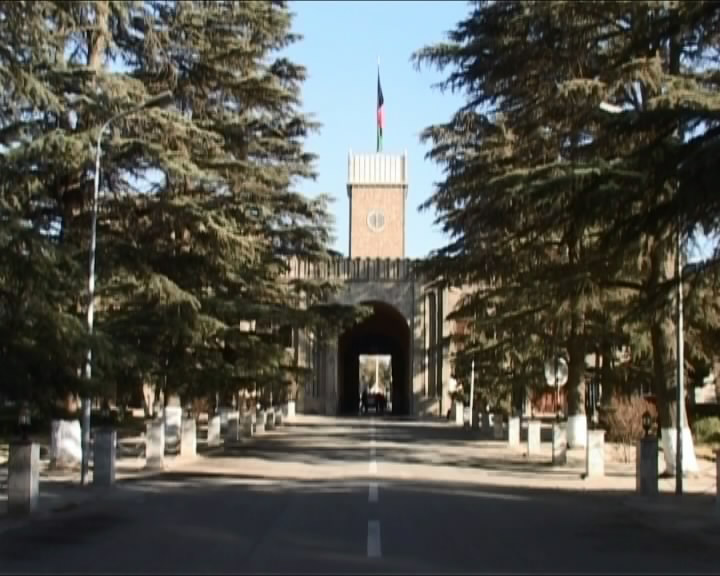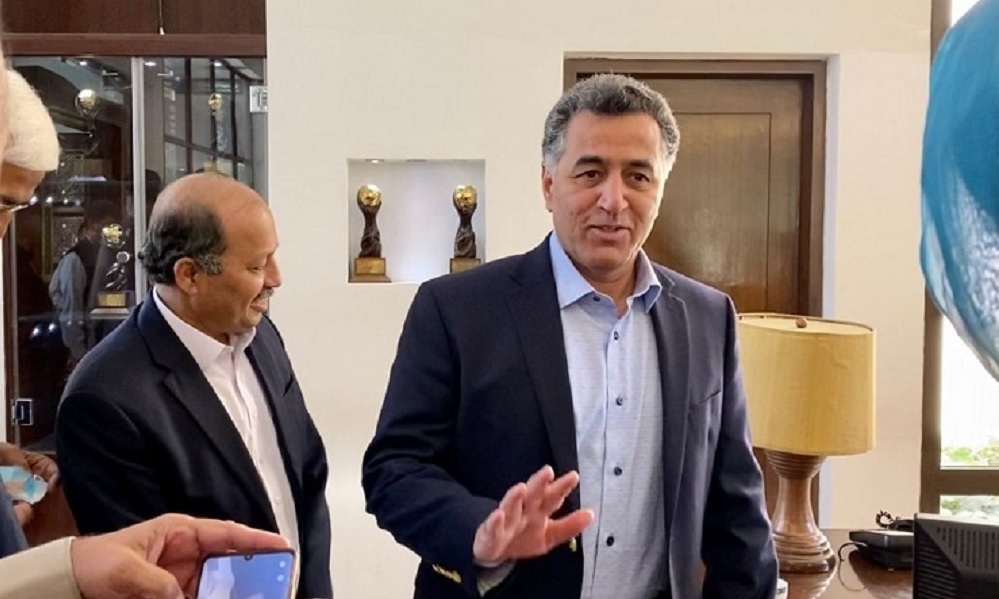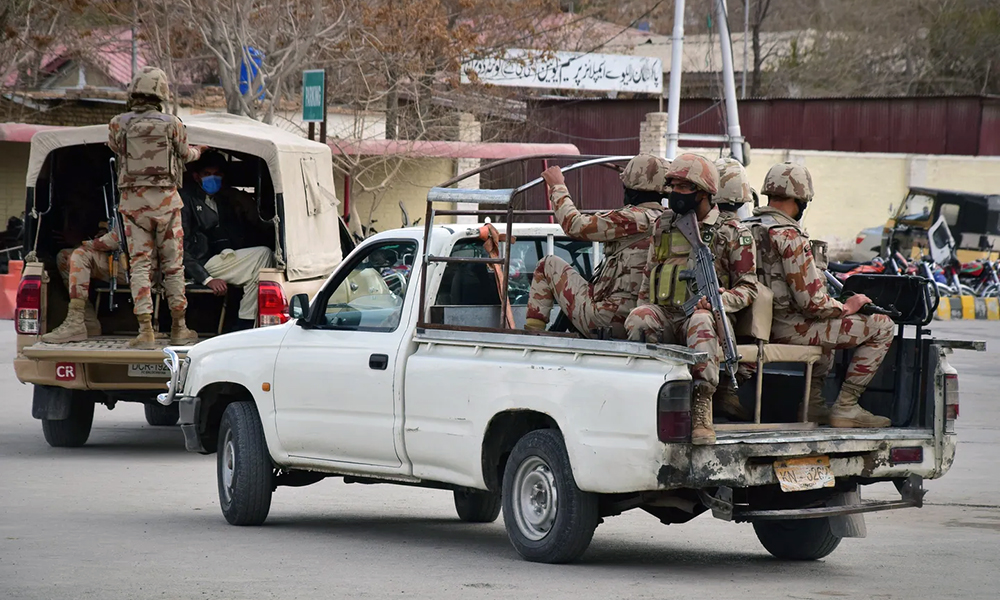Regional
Ghani visited Pul-e Charkhi prison to solve prisoner’s problems

President Ashraf Ghani Ahmad Zai visited Pul-e Charkhi prison and meet with the prisoners.
President Ghani visited Pul-e Charkhi prison late Wednesday and discussed about the prisoners issues.
In a statement from the presidential palace media office, the Pul-e Charkhi inmates claimed that they have been imprisoned for years without addressing to their cases.
The statement added that Ashraf Ghani Ahamd Zai ordered the attorney general office to review all inmates’ cases and present the report to him.
“More time is needed to compensate the past mistakes. Delegations have been appointed to review all cases of inmates and its results will be presented soon.” Ghani noted.
He also emphasized that those who were involved behind the killing of children, women and Afghan security forces should be punished for their crimes.

Regional
Pakistan’s ex-spy chief jailed for 14 years in rare military rebuke

A military court in Pakistan jailed former spy chief Faiz Hamid for 14 years on four charges including interference in politics, the army said on Thursday, in a rare conviction of a once-powerful general in the South Asian nation.
Hamid, in custody and under trial since August last year, was the chief of Pakistan’s powerful Inter-Services Intelligence agency from 2019 to 2021 under jailed former Prime Minister Imran Khan, and the two were considered close allies.”The accused was tried on four charges,” the military said in a statement, Reuters reported.
The charges ranged from engaging in political activities and violating the Official Secrets Act in a way detrimental to safety and state interest to misuse of authority and resources as well as causing wrongful loss to individuals, it added.
TIES TO JAILED FORMER PM IMRAN KHAN
The former general was found guilty on all the charges, the military said, without detailing the incidents. His conviction followed “lengthy and laborious legal proceedings”, it added, and Hamid has a right of appeal.
He also faces a separate investigation of his role in May 2023 attacks by thousands of Khan’s supporters on scores of military installations and offices to protest against the arrest of the 72-year-old former cricket star.
Information Minister Attaullah Tarar said Hamid had crossed “red lines” and acted as an advisor to Khan’s party to try to create chaos in the country.
Hamid’s lawyers or family could not be reached for comment. Khan’s PTI party did not immediately respond to a Reuters request for comment.
Khan has been in jail since August 2023.
Khan and nearly 150 of his party leaders and supporters have already been indicted by an anti-terrorism court on charges of inciting the attacks that also targeted military headquarters in the garrison city of Rawalpindi.
Khan and his associates deny the charges.
Hamid’s close ties to Khan, who blames the military for ousting him from power in 2022, were a source of tension between the cricketer-turned-politician and the military.
The military, which has directly ruled the nation of 241 million for more than three decades of its 77-year independent history, plays a big role in making or breaking governments.
Regional
Six Pakistani soldiers killed in TTP attack in Kurram District
Islamabad has accused TTP fighters of using Afghan territory to stage attacks inside Pakistan, a claim Kabul denies, insisting that Pakistan’s security problems are internal matters.

Six Pakistani soldiers were killed and four others injured when militants attacked a security checkpoint in northwest Pakistan’s Kurram district, officials confirmed on Tuesday. The Tehreek-e-Taliban Pakistan (TTP) claimed responsibility for the assault.
The attack took place in the Manato area late Monday afternoon, according to a police officer at the district’s emergency control room. A government official, speaking on condition of anonymity, told AFP that two militants were also killed during the exchange of fire.
Security forces later identified one of the dead militants as local TTP commander Usman Khyberi.
The incident comes amid heightened tensions between Pakistan and Afghanistan, as both sides struggle to maintain a fragile calm following deadly border clashes in October—the worst since the Islamic Emirate took control of Kabul in 2021.
Sporadic skirmishes have continued, including heavy exchanges of fire last week that left at least five people dead.
Islamabad has accused TTP fighters of using Afghan territory to stage attacks inside Pakistan, a claim Kabul denies, insisting that Pakistan’s security problems are internal matters.
Efforts to broker a lasting truce have so far failed. Three rounds of peace talks—facilitated by Qatar, Türkiye, and Saudi Arabia—have not produced a breakthrough.
Regional
Putin questions US punishing India for buying Russian oil
Hours earlier, Modi received Putin at the airport in Delhi, a rare gesture underlining the warm ties between the leaders.

Russian President Vladimir Putin challenged heavy U.S. pressure on India not to buy Russian fuel if the U.S. could do so as he began a two-day state visit, where he was embraced on arrival by Indian Prime Minister Narendra Modi.
Putin spoke in comments to Indian broadcaster India Today, aired hours after landing in New Delhi for a visit during which both countries are seeking to boost mutual trade and expand the variety of items in transactions.
New Delhi and Moscow have strong ties going back to the days of the former Soviet Union, and Russia has been the main source of arms for India for decades. India has also emerged as the top buyer of seaborne Russian oil despite Western sanctions imposed after Moscow launched its invasion of Ukraine in February 2022.
India’s crude imports, however, are set to hit a three-year low this month following a punitive U.S. tariff on Indian goods and a tightening of sanctions on Russia, as U.S. President Donald Trump’s administration says India’s purchases of cheap Russian oil help finance Moscow’s war in Ukraine.
“The United States itself still buys nuclear fuel from us for its own nuclear power plants. That is also fuel,” Putin told India Today.
“If the U.S. has the right to buy our fuel, why shouldn’t India have the same privilege? This question deserves thorough examination, and we stand ready to discuss it, including with President Trump,” he said.
India has said Trump’s tariffs are unjustified and unreasonable and pointed at ongoing U.S. trade with Moscow. The U.S. and European Union continue to import billions of dollars worth of Russian energy and commodities, ranging from liquefied natural gas to enriched uranium.
“There is a certain decline in overall trade turnover during the first nine months of this year,” Putin said when asked if Indian oil purchases had fallen under pressure from the West.
“This is just a minor adjustment. Overall, our trade turnover stands almost at the same level as before.”
He added: “Trade in petroleum products and crude oil … Russian oil, is running smoothly in India.”
Asked how India and Russia should deal with Trump and his tariffs, Putin said the U.S. President has advisers who believe that implementing such tariff policies ultimately benefits the U.S. economy. “We hope that, in the end, all violations of World Trade Organization regulations will be rectified,” he said.
Hours earlier, Modi received Putin at the airport in Delhi, a rare gesture underlining the warm ties between the leaders.
They embraced on a red carpet on the tarmac and then drove away in the same vehicle for a private dinner hosted by Modi.
Senior Russian ministers and a large Russian business delegation were in New Delhi for Putin’s visit and the two leaders will hold summit talks on Friday when they are expected to announce a raft of deals.
“Delighted to welcome my friend, President Putin to India. India-Russia friendship is a time-tested one that has greatly benefited our people,” Modi posted on X ahead of the dinner.
India and Russia aim to raise two-way trade to $100 billion by 2030. Their commerce rose more than five-fold from about $13 billion in 2021 to near $69 billion in 2024–25, almost entirely driven by Indian energy imports.
Bilateral trade eased to $28.25 billion in April–August 2025, reflecting a decline in crude oil imports.
At the same time, India is looking for new destinations to increase exports of its goods hit by the punishing 50% tariff imposed by Trump.
Russia wants to import more Indian goods to balance bilateral trade, which is currently heavily skewed towards energy, Deputy Kremlin Chief of Staff Maxim Oreshkin told a business conference in New Delhi earlier on Thursday.
Indian Trade Minister Piyush Goyal said New Delhi wants to diversify exports to Russia and increase sales of automobiles, electronics goods, data-processing equipment, heavy machinery, industrial components, textiles, and foodstuffs.
-

 Sport4 days ago
Sport4 days agoILT20: Desert Vipers edge Gulf Giants in historic super over thriller
-

 Latest News2 days ago
Latest News2 days agoMuttaqi: Afghanistan’s progress requires both religious and modern education
-

 Regional4 days ago
Regional4 days agoSix Pakistani soldiers killed in TTP attack in Kurram District
-

 Business4 days ago
Business4 days agoTrade bodies warn almost 11,000 Afghan transit containers stuck at Karachi port
-

 World4 days ago
World4 days agoPowerful 7.6 earthquake hits northern Japan, tsunami warnings issued
-

 Latest News3 days ago
Latest News3 days agoTrump calls Afghanistan a ‘hellhole’ country as US expands immigration restrictions
-

 Sport5 days ago
Sport5 days agoSorkh Poshan Khafi defeats Sarsabz Yashlar 4-0 in Afghanistan Champions League
-

 Sport3 days ago
Sport3 days agoCommanding wins for Arman FC and Sarsabz Yashlar in Afghanistan Champions League

















